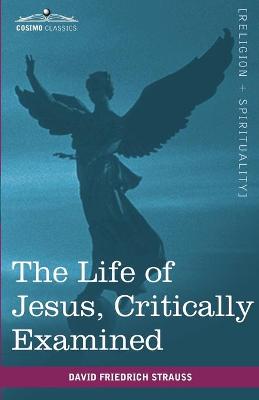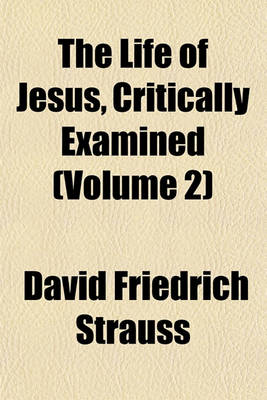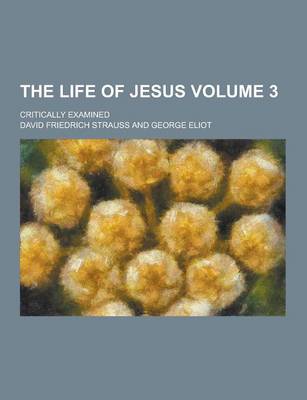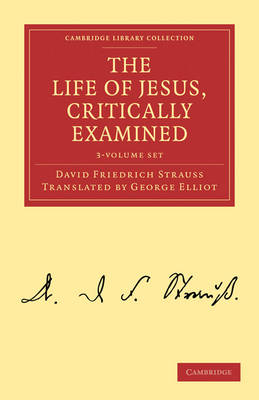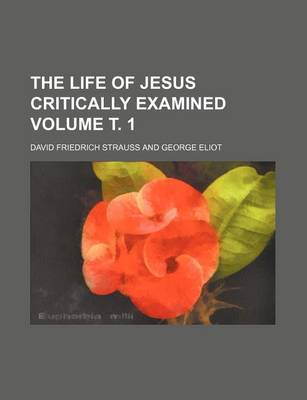Cambridge Library Collection - Religion
3 primary works • 5 total works
Volume 1
Strauss's interpretation of biblical events was a result of, and a response to, the attacks on orthodox Christianity brought by the Enlightenment. In the face of scepticism about such biblical events as miracles, his aim was to explain how Christians came to believe when there was no objective historical basis for their faith. Taking the resurrection as the key article of faith, his verdict was that religion was an expression of the human mind's ability to generate myths and interpret them as truths revealed by God. Influenced by Hegel and Schleiermacher, Strauss characterized Christianity as a stage in the evolution of pantheism that had reached its culmination in Hegelian philosophy. He therefore created a new atmosphere of scholarship on Christ's life and historical criticism of the Bible. The furore turned "The Life of Jesus" (1835) into a "cause celebre" and to German liberals Strauss became a symbol for the freedom of thought. The text helped transform the nature of biblical criticism, and Strauss became the centre of controversy. The book is also George Eliot's first published book. It is translated from the 4th edition - Strauss's preferred version.
Volume 2
The Life of Jesus, Critically Examined (Volume 2)
by David Friedrich Strauss
Published 26 March 2010
The German theologian David Friedrich Strauss (1808-1874) first published his highly controversial The Life of Jesus in three volumes between 1835 and 1836. This translation, by George Eliot, is based on the fourth German edition (1840). In this work Strauss applied strict historical methods to the New Testament gospel narratives and caused scandal across the Protestant world by concluding that all miraculous elements in the life of Jesus were mythical and ahistorical. In volume 2 Strauss applies modern historical criticism to 'de-mythologize' the idea of Jesus as Messiah; the narratives about the disciples; the discourses in the Synoptic gospels and the Fourth Gospel; the non-miraculous events; and the miracles' narratives. This is a key text of nineteenth-century theology that pioneered the application of historical and scientific methods to the study of religions and religious texts. It is essential reading for any student of the New Testament.
Volume 3
The Life of Jesus; Critically Examined Volume 3
by David Friedrich Strauss
Published 2 September 2010
The German theologian David Friedrich Strauss (1808-1874) published his highly controversial The Life of Jesus in three volumes between 1835 and 1836. This translation, by George Eliot, is based on the fourth German edition (1840). In this work Strauss applied strict historical method to the New Testament gospel narratives and caused scandal across the Protestant world by concluding that all miraculous elements were mythical and ahistorical. Volume 3 applies modern historical criticism to 'de-mythologize' the narratives of the transfiguration, Jesus' final journey into Jerusalem, the passion, the death, and the resurrection; and investigates the historicity of Jesus' enemies. The volume concludes with an essay entitled 'The Dogmatic Import of the Life of Jesus'. This is a key text of nineteenth-century theology that pioneered the application of historical and scientific methods to the study of religious texts. It is essential reading for any student of the New Testament.
The Life of Jesus, Critically Examined 3 Volume Set
by David Friedrich Strauss
Published 2 September 2010
The German theologian David Friedrich Strauss (1808-1874) published his highly controversial The Life of Jesus in three volumes between 1835 and 1836. This translation, by George Eliot, is based on the fourth German edition (1840). Strauss applied strict historical method to the gospel narratives and caused scandal across the Protestant world by concluding that all miraculous elements were mythical and ahistorical. Volume 1 introduces the idea of 'de-mythology' and applies modern historical methods to the narratives of Jesus' birth and early life; Volume 2 studies the idea of Jesus as Messiah, the narratives about the disciples, the discourses, and the miracles; and Volume 3 focuses on the passion, death and resurrection narratives with a concluding essay: 'The Dogmatic Import of the Life of Jesus'. This is a key text of nineteenth-century theology that pioneered the application of historical and scientific methods to the study of religious texts.
The German theologian David Friedrich Strauss (1808-1874) published his highly controversial The Life of Jesus in three volumes between 1835 and 1836. This translation by George Eliot is based on the fourth German edition (1840). Strauss applied strict historical method to the gospel narratives and caused scandal across the Protestant world by concluding that all miraculous elements were mythical and ahistorical. Strauss introduces Volume 1 with a survey of 'de-mythology' in Western thought. He applies modern historical and scientific criticism to the annunciation and birth narratives; the Davidic descent and genealogies of Jesus; Jesus' visit to the temple; Jesus' baptism and temptation and his relationship with John the Baptist. The volume ends with a chapter on chronology and locality in the life of Jesus. This is a key text of nineteenth-century theology that pioneered the application of historical and scientific methods to the study of religious texts.
